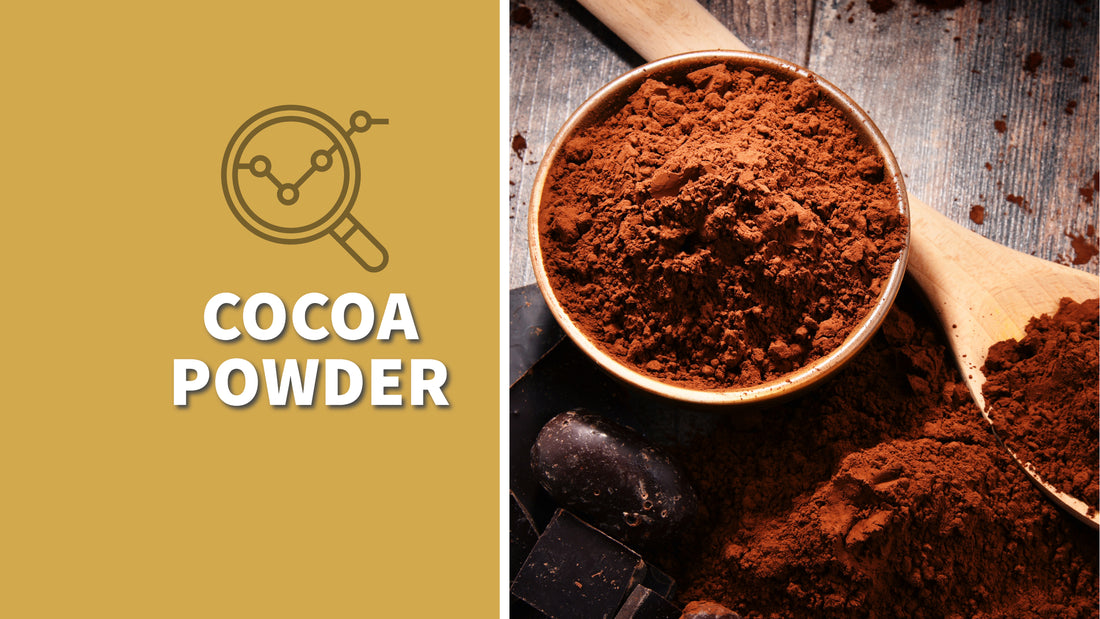
Cocoa Powder Guide
Cocoa powder is a highly versatile and flavorful ingredient derived from cocoa beans, the seeds of the cacao tree. It is well-known for its rich, bitter chocolate flavor and is a staple in various culinary creations, ranging from desserts to savory dishes.
Production Process:
- Harvesting and Fermentation: The process begins with the harvesting of ripe cocoa pods from the cacao tree. The pods are opened to extract the cocoa beans, which are then fermented for several days. Fermentation is crucial as it develops the beans' flavor and reduces their bitterness.
- Drying and Roasting: After fermentation, the beans are dried and then roasted. Roasting further develops the flavor and aroma of the beans. The temperature and duration of roasting can vary, affecting the final taste of the cocoa powder.
- Cracking and Winnowing: The roasted beans are cracked to separate the nibs (the edible part of the bean) from the shells. The nibs are then winnowed to remove any remaining shell fragments.
- Grinding and Pressing: The nibs are ground into a paste known as chocolate liquor. This liquor is then pressed to separate the cocoa solids from the cocoa butter. The remaining solid mass is then finely ground to produce cocoa powder.
Applications:
Cocoa powder is used extensively in the food industry. Its applications include:
- Baking: Essential for making chocolates, cakes, brownies, and cookies.
- Beverages: Key ingredient in hot chocolate and mocha drinks.
- Savory Cooking: Used in mole sauces and some meat rubs.
- Confectionery: Integral in chocolate bars, truffles, and candy making.
- Dairy Products: Flavors ice creams, yogurts, and milkshakes.
Nutrition:
Cocoa powder is rich in flavonoids, antioxidants, and minerals like iron, magnesium, and zinc. It is low in fat and calories, making it a healthier alternative to chocolate bars that contain added sugars and milk.
Types of Cocoa Powders:
- Natural Cocoa Powder: This is the most basic form, made by grinding cocoa solids into a fine powder. It has a light brown color and a strong, bitter taste.
- Dutch-Process Cocoa Powder: Treated with an alkalizing agent to neutralize its acids, Dutch-process cocoa powder has a darker color, and a milder flavor, and it dissolves more easily in liquids. It's preferred for recipes that require baking soda.
- Black Cocoa Powder: Further alkalized than the Dutch-process, black cocoa powder has a very dark color and a milder chocolate flavor. It's often used for Oreo-type cookies.
- Unsweetened Cocoa Powder: Contains no added sugars and offers a pure, intense chocolate flavor.
- Cocoa Mixes: These are typically a blend of cocoa powder with sweeteners and sometimes dairy, designed for making instant hot chocolate.
Each type of cocoa powder has unique characteristics and can be chosen based on the desired flavor profile and recipe requirements.
Home Use:
In the home setting, whey protein is often used as a dietary supplement with various flavors and blend types. It can be easily incorporated into smoothies, shakes, or even regular meals to increase protein intake. Its versatility also allows it to be used in baking or cooking, adding a protein boost to pancakes, muffins, or homemade protein bars. Unflavored whey protein can also be purchased for more creative use in the kitchen.
Athletic Use:
Athletes sometimes use cocoa powder as a natural supplement. Its flavonoid content is believed to support muscle recovery and cardiovascular health, making it a beneficial addition to post-workout recovery and overall health boost.
Health Benefits of Cocoa Powder
Cocoa powder, derived from the cacao bean, is more than just a key ingredient for chocolate lovers. It offers a variety of health benefits, making it a valuable addition to a balanced diet. Here's an overview of the health benefits associated with cocoa powder:
Rich in Antioxidants: Cocoa powder is loaded with antioxidants, particularly flavonoids. These compounds help neutralize harmful free radicals in the body, reducing oxidative stress and potentially lowering the risk of chronic diseases.
Heart Health: The flavonoids in cocoa powder can have a positive impact on heart health. They help improve blood flow, lower blood pressure and reduce the risk of heart attack and stroke by improving vascular function and decreasing inflammation.
Mood Enhancement: Cocoa contains compounds like theobromine and phenylethylamine, which can boost mood and promote a sense of well-being. It also stimulates the production of endorphins, the body's natural "feel-good" chemicals.
Brain Health: The flavonoids in cocoa may have neuroprotective effects. They can improve cognitive function, especially in older adults, and may reduce the risk of neurodegenerative diseases.
Diabetes Management: Some studies suggest that cocoa flavonoids can improve insulin sensitivity and blood sugar control, which is beneficial for managing type 2 diabetes.
Skin Health: The antioxidants in cocoa can protect the skin from oxidative stress, potentially improving skin health and reducing signs of aging.
Anti-Inflammatory Properties: Cocoa has anti-inflammatory properties, which can be beneficial in reducing the risk of some inflammatory-related conditions.
Weight Management: While cocoa itself is not a weight loss product, its rich flavor can increase the satisfaction of meals and potentially help in controlling appetite when used as part of a balanced diet.
Cancer Prevention: The antioxidants in cocoa may play a role in cancer prevention by protecting cells from damage that can lead to tumor growth.
Oral Health: Unlike many sweet treats, cocoa powder (without added sugar) is non-cariogenic, meaning it does not contribute to tooth decay. Certain compounds in cocoa might have antibacterial properties that could benefit oral health.
Incorporating cocoa powder into your diet can be a delicious way to enjoy these health benefits. However, it's important to consume it in moderation and as part of a balanced diet, as many chocolate products contain added sugars and fats that can negate these benefits.
Cocoa Powder We Use
The cocoa powder we use for our food products is sourced from reputable companies that adhere to strict food safety guidelines while also building up local farmers and communities to ensure that quality of life and environment are paramount.
Home Use:
In-home kitchens, cocoa powder is a staple for baking and cooking. It's used to make classic desserts like chocolate cakes, brownies, and cookies. Beyond sweets, it's also incorporated into savory dishes, such as chili or mole sauces, adding depth and complexity to the flavors. Cocoa powder, by capturing the main flavor component of the cacao fruit, offers more flexibility in adding chocolate flavor to a food product when compared to chocolate bars.
FAQ:
Is cocoa powder safe to consume?
Yes, cocoa powder is generally safe for consumption. However, moderation is key due to its caffeine content.
Should I be concerned about metals in cocoa?
Some cocoa powders may contain trace amounts of metals like lead or cadmium. It's important to choose products from reputable brands that adhere to safety standards.
Does cocoa powder have allergens?
Pure cocoa powder is free from major allergens like nuts, gluten, and dairy. However, cross-contamination can occur during processing, so it's important to check labels if you have specific allergies.
Why is cocoa powder added to food products?
Cocoa powder adds a rich chocolate flavor and color to food products. It also contributes antioxidants and can enhance the nutritional profile of foods.
How is cocoa powder digested in our bodies?
Cocoa powder is digested and metabolized like other plant-based foods, with its nutrients absorbed in the intestines.
What is the taste and aroma of cocoa powder?
Cocoa powder has a deep, rich chocolate flavor with a slightly bitter undertone. Its aroma is distinctly chocolatey, often described as warm and comforting.
Can I bake or cook with cocoa powder?
Absolutely. Cocoa powder is versatile and can be used in a variety of baked goods, desserts, and even savory dishes.
How do you store cocoa powder?
Store it in a cool, dry place, away from direct sunlight and moisture. An airtight container is best to preserve its flavor and freshness.
Is cocoa powder natural?
Yes, cocoa powder is a natural product made from cacao beans, with no artificial additives in its pure form.
Is cocoa powder shelf-stable?
Yes, cocoa powder is shelf-stable and has a long shelf life when stored properly.
What are the signs of quality cocoa powder?
Quality cocoa powder should have a fine, smooth texture, a rich color, and a strong chocolate aroma. It should not have any off-smells or signs of moisture.
Does cocoa powder have stimulants?
Cocoa powder has a trace amount of caffeine which is insignificant compared to traditional brewed coffee. Cocoa powder also has a small amount of theobromine that may have a mild relaxing effect.
